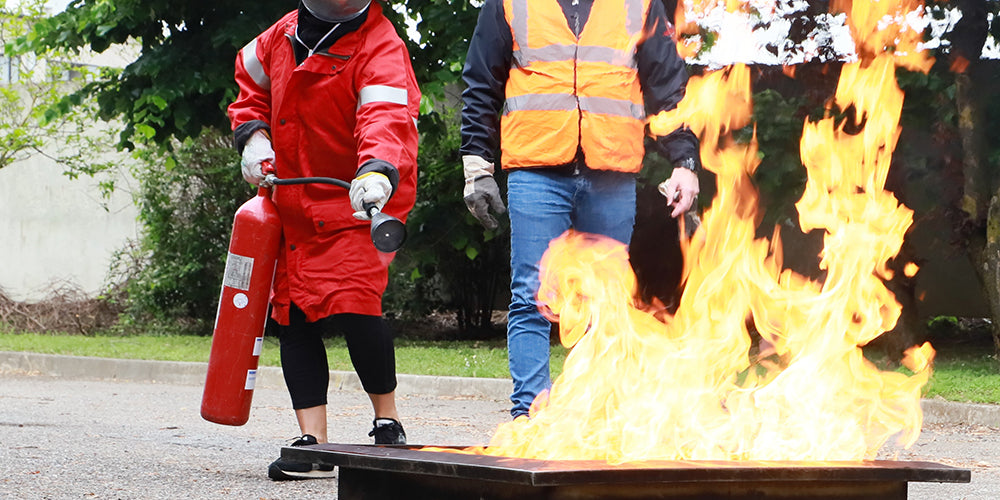You have no items in your shopping basket.
First aid (social care) eLearning courses
The vital importance of effective First aid in UK Social care settings
Rose Mabiza
15-04-2024
First aid isn't just necessary in workplaces; it's a lifeline, especially in social care settings where vulnerable individuals rely on timely assistance. In the UK, where over 1.5 million people work in social care, ensuring effective first aid provision is paramount. In this blog, Rose Mabiza delves into why first aid matters in social care, exploring key facts, legislation, best practices, and recommendations for both providers and caregivers.
Key facts and statistics
- According to the Health and Safety Executive (HSE), over 600,000 workplace injuries occur annually in the UK.
- In social care settings, emergencies can range from falls and choking incidents to medical crises like strokes or seizures.
- The Care Quality Commission (CQC) highlights the importance of first aid in its inspection criteria, emphasising the need for trained staff and robust policies.
- Studies show that prompt First Aid intervention can significantly improve outcomes, reducing the risk of complications or long-term health issues.

Image by Rawpixel via Envato Elements

Image by Pressmaster via Envato Elements
Key definitions
First aid in social care encompasses immediate assistance provided to individuals in response to medical emergencies or injuries within social care settings. It involves recognising and responding to emergencies, administering basic life support, and stabilising individuals until professional medical help arrives.
Relevant legislation, regulations, and best practices
- The Health and Safety (First-Aid) Regulations 1981 mandate employers to provide adequate first aid provisions, facilities, and trained personnel in the workplace.
- The Care Quality Commission (CQC) sets standards for the quality and safety of care in social care settings, including requirements for first aid training and policies.
- Best practices include regular first aid training for staff, clear procedures for emergency response, and maintaining well-stocked first aid kits.

Image by LightFieldStudios via Envato Elements

Image by RossHelen via Envato Elements
Essential first aid training for social care - Ensuring safety and well-being
- Importance of effective first-aid training - Effective first-aid training equips caregivers with the skills and confidence to respond swiftly and appropriately to emergencies. It empowers individuals to assess situations, administer aid, and potentially save lives. In social care settings, where individuals may have complex needs or vulnerabilities, trained staff can make all the difference in ensuring the safety and well-being of those they support.
- Recognising the signs of medical emergencies - One of the fundamental aspects of first aid training is recognising the signs of medical emergencies. Caregivers learn to identify symptoms such as sudden chest pain, difficulty breathing, loss of consciousness, or severe allergic reactions. Early recognition enables timely intervention, preventing complications and providing crucial support until professional help arrives.
- Implementing effective policies and procedures - Robust first aid policies and procedures are essential for effective emergency response in social care settings. These should outline clear protocols for assessing emergencies, contacting emergency services, and providing appropriate aid. Regular training and drills ensure staff are familiar with procedures and can act swiftly and confidently in emergencies.
- Creating a culture of safety - Effective first aid goes beyond just having the right procedures in place; it's about fostering a culture of safety within the organisation. Encouraging open communication, providing ongoing training opportunities, and recognising and rewarding staff for their vigilance in First Aid contribute to creating a safer environment for everyone.
Recommendations
Ensuring the safety and preparedness of our teams and caregivers is paramount. Here’s how organisations and individual caregivers can actively promote a culture of safety through effective first aid measures.
For organisations
- Invest in accredited first aid training for all staff members involved in caregiving roles.
- Regularly review and update first aid policies and procedures to align with legislation and best practices.
- Conduct drills and simulations to ensure staff readiness to respond effectively to emergencies.
- Provide access to well-stocked first aid kits and resources for staff to use in emergencies.
For caregivers
- Attend regular first aid training sessions to refresh skills and knowledge.
- Familiarise yourself with your organisation's first aid policies and procedures.
- Stay vigilant and be proactive in recognising signs of medical emergencies among those you support.
- Communicate any concerns or incidents promptly to the appropriate personnel.

Image by PlatooFotography via Envato Elements

Image by LightFieldStudios via Envato Elements
Conclusion
Effective first aid is not just a legal requirement; it's a moral obligation in social care settings where lives may depend on timely intervention. By prioritising first aid training, implementing robust policies, and fostering a culture of safety, organisations can ensure the well-being of both staff and those they support. Together, let's commit to making first aid a cornerstone of excellence in UK social care settings.
Take the first step towards ensuring effective first aid provision in your social care setting. Explore our accredited first aid training options tailored to your organisation's needs. Let's empower your staff to be confident and competent first aid responders, enhancing the safety and well-being of everyone under your care.
First aid isn't just necessary in workplaces; it's a lifeline, especially in social care settings where vulnerable individuals rely on timely assistance. In the UK, where over 1.5 million people work in social care, ensuring effective first aid provision is paramount. In this blog, Rose Mabiza delves into why first aid matters in social care, exploring key facts, legislation, best practices, and recommendations for both providers and caregivers.
Key facts and statistics

Image by Rawpixel via Envato Elements
- According to the Health and Safety Executive (HSE), over 600,000 workplace injuries occur annually in the UK.
- In social care settings, emergencies can range from falls and choking incidents to medical crises like strokes or seizures.
- The Care Quality Commission (CQC) highlights the importance of first aid in its inspection criteria, emphasising the need for trained staff and robust policies.
- Studies show that prompt First Aid intervention can significantly improve outcomes, reducing the risk of complications or long-term health issues.
Key definitions

Image by Pressmaster via Envato Elements
First aid in social care encompasses immediate assistance provided to individuals in response to medical emergencies or injuries within social care settings. It involves recognising and responding to emergencies, administering basic life support, and stabilising individuals until professional medical help arrives.
Relevant legislation, regulations, and best practices

Image by LightFieldStudios via Envato Elements
- The Health and Safety (First-Aid) Regulations 1981 mandate employers to provide adequate first aid provisions, facilities, and trained personnel in the workplace.
- The Care Quality Commission (CQC) sets standards for the quality and safety of care in social care settings, including requirements for first aid training and policies.
- Best practices include regular first aid training for staff, clear procedures for emergency response, and maintaining well-stocked first aid kits.
Essential first aid training for social care - Ensuring safety and well-being

Image by RossHelen via Envato Elements
- Importance of effective first-aid training - Effective first-aid training equips caregivers with the skills and confidence to respond swiftly and appropriately to emergencies. It empowers individuals to assess situations, administer aid, and potentially save lives. In social care settings, where individuals may have complex needs or vulnerabilities, trained staff can make all the difference in ensuring the safety and well-being of those they support.
- Recognising the signs of medical emergencies - One of the fundamental aspects of first aid training is recognising the signs of medical emergencies. Caregivers learn to identify symptoms such as sudden chest pain, difficulty breathing, loss of consciousness, or severe allergic reactions. Early recognition enables timely intervention, preventing complications and providing crucial support until professional help arrives.
- Implementing effective policies and procedures - Robust first aid policies and procedures are essential for effective emergency response in social care settings. These should outline clear protocols for assessing emergencies, contacting emergency services, and providing appropriate aid. Regular training and drills ensure staff are familiar with procedures and can act swiftly and confidently in emergencies.
- Creating a culture of safety - Effective first aid goes beyond just having the right procedures in place; it's about fostering a culture of safety within the organisation. Encouraging open communication, providing ongoing training opportunities, and recognising and rewarding staff for their vigilance in First Aid contribute to creating a safer environment for everyone.
Recommendations

Image by PlatooFotography via Envato Elements
Ensuring the safety and preparedness of our teams and caregivers is paramount. Here’s how organisations and individual caregivers can actively promote a culture of safety through effective first aid measures.
For organisations
- Invest in accredited first aid training for all staff members involved in caregiving roles.
- Regularly review and update first aid policies and procedures to align with legislation and best practices.
- Conduct drills and simulations to ensure staff readiness to respond effectively to emergencies.
- Provide access to well-stocked first aid kits and resources for staff to use in emergencies.
For caregivers
- Attend regular first aid training sessions to refresh skills and knowledge.
- Familiarise yourself with your organisation's first aid policies and procedures.
- Stay vigilant and be proactive in recognising signs of medical emergencies among those you support.
- Communicate any concerns or incidents promptly to the appropriate personnel.
Conclusion

Image by LightFieldStudios via Envato Elements
Effective first aid is not just a legal requirement; it's a moral obligation in social care settings where lives may depend on timely intervention. By prioritising first aid training, implementing robust policies, and fostering a culture of safety, organisations can ensure the well-being of both staff and those they support. Together, let's commit to making first aid a cornerstone of excellence in UK social care settings.
Take the first step towards ensuring effective first aid provision in your social care setting. Explore our accredited first aid training options tailored to your organisation's needs. Let's empower your staff to be confident and competent first aid responders, enhancing the safety and well-being of everyone under your care.
About the author
Dr Richard Dune

With over 20 years of experience, Richard blends a rich background in NHS, the private sector, academia, and research settings. His forte lies in clinical R&D, advancing healthcare tech, workforce development and governance. His leadership ensures regulatory compliance and innovation align seamlessly.
Related blog articles
View allContact us
Complete the form below to start your ComplyPlus trial and transform your regulatory compliance solutions.







